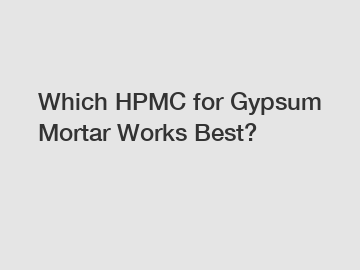Which HPMC for Gypsum Mortar Works Best?
Which HPMC for Gypsum Mortar Works Best?
Gypsum mortar, a popular building material, has been used for centuries due to its excellent properties. It provides strength, durability, and fire resistance to structures. However, to optimize its performance, additives are often necessary. In particular, Hydroxypropyl Methylcellulose (HPMC) is widely used as an additive in gypsum mortar to improve workability, adhesion, and water retention. But with so many options available, which HPMC variant works best for gypsum mortar? Let's explore this question in detail.
1. Understand the Role of HPMC in Gypsum Mortar.

HPMC is a versatile additive that significantly influences the performance of gypsum mortar. It acts as a thickener, water retention agent, and binder. By adding HPMC, the workability of the mortar improves, allowing it to be easily spread and shaped. Furthermore, HPMC enhances the adhesion between the mortar and various substrates, ensuring a secure and long-lasting bond. Lastly, HPMC aids in water retention, preventing rapid drying and reducing the risk of cracking.
2. The Impact of HPMC Viscosity.
Viscosity plays a crucial role in determining the performance of HPMC in gypsum mortar. Different HPMC variants have different viscosities, ranging from low to high. Low viscosity HPMC is suitable for gypsum mortars that require fast setting and early strength development. On the other hand, high viscosity HPMC is recommended for mortars that need prolonged workability and increased water retention. Understanding the specific requirements of your project and selecting the appropriate HPMC viscosity is essential for optimal results.
3. Consider the Substrate and Environmental Conditions.
The selection of the right HPMC for gypsum mortar also depends on the substrate and environmental conditions. If the mortar is to be applied on a non-absorbent surface such as ceramic tiles, a specific HPMC variant with improved adhesion properties should be chosen. Similarly, in high-temperature environments, an HPMC with enhanced thermal stability is preferable. Considering these factors ensures that the HPMC selected is compatible with the project requirements.
4. Compatibility with Other Additives.
It is common to use multiple additives in gypsum mortars, such as retarders, air entrainers, or plasticizers. When choosing the HPMC variant, compatibility with these additional additives should be considered. Some HPMC variants may interact with certain additives, affecting their efficacy. Therefore, it is essential to consult the manufacturer's guidelines or conduct compatibility tests before finalizing the HPMC choice.
In conclusion, selecting the suitable HPMC variant for gypsum mortar is crucial to achieve desired results in terms of workability, adhesion, and water retention. Factors like viscosity, substrate, environmental conditions, and compatibility with other additives play a significant role in this selection process. By carefully considering these aspects, constructors and manufacturers can optimize the performance of their gypsum mortar, leading to better structural integrity and durability.
So, the next time you find yourself wondering, "Which HPMC for gypsum mortar works best?," remember to analyze the specific requirements of your project and make an informed decision. With the right HPMC variant, you can enhance the properties of gypsum mortar and ensure the success of your construction or renovation project.
Are you interested in learning more about Redispersible latex powder, HPMC for tile adhesive, HPMC for construction mortar? Contact us today to secure an expert consultation!


